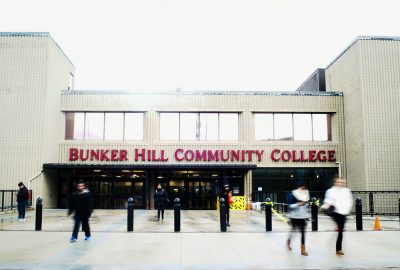
Boston Mayor Martin Walsh announced the launch of the GRAD Last Mile Fund Friday, a scholarship program designed to help Boston students complete their higher education and obtain college degrees.
The City has partnered with the Frieze Family Foundation to fund the pilot year of the program. The funds will be distributed to five public schools with high attendance by Boston students: Bunker Hill Community College, Roxbury Community College, MassBay Community College, the University of Massachusetts Boston and the Benjamin Franklin Institute of Technology.
Walsh said in an official press release that the fund will allow for more students in the Boston area to experience the satisfaction of earning college degrees.
“Financial hardship should not prevent any student from completing the ‘last mile’ on their journey toward earning a college degree,” Walsh said in the release, “and I am proud that through this new fund, we will be able to help more students cross the finish line and earn their degree.”
Marvin Loiseau, dean of recruitment at the Benjamin Franklin Institute of Technology, wrote in an email that the college plans to use the funding they receive to assist students in their last term of schooling and eliminate barriers to graduating from their program.
“We love any opportunity to work with the City on programs like this that serve our inner-city Boston youth,” Loiseau wrote. “It is always helpful to have funding for programs that serve underrepresented youths.”
The fund will distribute $120,000 in total to the five schools for the pilot year of the program and will provide up to $2,500 in financial support to individual students, according to the program website. The fund is also currently accepting donations for the pilot year and beyond.
Faith Ryan, 24, of Fenway, said she thinks the fund is a beneficial idea and that any money for students is helpful.
“It’s probably not enough money to do much,” Ryan said, “but I guess it’s a little step to the right direction.”
Eligible students for the program must have lived in Boston for two years at the time of the award. They must also demonstrate financial need and be on track to graduate in the next semester, according the City of Boston website.
Curtis Cormier, director of financial aid at MassBay, said the GRAD Last Mile Fund is a different form of financial aid than the federal, state and institutional scholarship that the school already provides. Instead, he said, the target audience of the fund is what makes it stand out.
“The scholarship is definitely unique in the sense that we don’t have any particular funds that are geared for the very last term of students enrolled in their program,” Cormier said.
Top priority for this funding will be provided to students who have not yet registered for their last college semester or paid their tuition by a set cutoff date, have exhausted other sources of available aid, are undocumented immigrants, DACA recipients, parents and/or veterans, according to the release.
“DACA students sometimes can be hesitant,” Cormier said. “We don’t go out and particularly ask them that question, but if we know of any students that are DACA students, we do reach out.”
Stephanie Wild, 45, said she thinks the program sounds helpful to low-income students.
“I think it’s probably a harder time for students to get financial aid or help when they need it,” the South End resident said. “I think it’s so competitive right now. I have young children, so I’m kind of scared for when they’re older. So, I think as a pilot program, that sounds really nice.”
Schools have been promoting the GRAD Last Mile Fund through their own means on campus. UMass Boston Director of Financial Aid Katherine Lynch wrote in an email that the university is marketing the fund through its advising collaborative, which is a group of advising and student service staff on campus.
“These staff members are frequently meeting with students and are able to make them aware of the fund if appropriate situations arise,” Lynch wrote.
Machito Guaring, 49, of the North End, said there is likely more that needs to be done to reduce or totally eliminate the rising cost of higher education.
“One of the better initiatives is if [the country] could just do free education,” Cachito said. “Although, I know that’s next to impossible, but I think it would be a very good idea to explore.”


















































































































